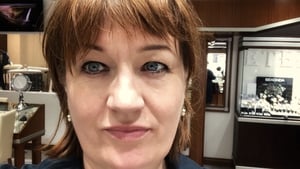Tech and business reporter Adam Maguire talks to Colm Ó Mongáin about about spring cleaning your cyber life and ditching the digital clutter. Listen back above.
The digital debris we leave behind is largely unseen; but it still costs the earth. Adam Maguire spoke to Colm Ó Mongáin about the volumes of 'dark data', which rack up hefty energy bills; despite being rarely accessed.
Adam explains how we got here, and he shares tips on digital spring cleaning; which has the double benefit of easing the environmental cost of storage and helping our devices work much faster.
We all have thousands of photos, videos and emails stored on our devices, on the cloud or both; many of which we'll never access again. Added to that, our social media apps have their own separate inboxes and messaging systems. Powering the data centres needed to store all of this stuff takes a lot of energy and we are building more and more of them, Adam says:
"Increasingly so in Ireland, in terms of the amount of energy that's being used, it's only going to increase in terms of data centres, because these massive data centres are being built and we’re relying on them more and more as well because we’re using these digital services more and generating more and more data."

For all the money and energy it takes to keep the lights on in the data centres and keep the machines from overheating, Adam says that they are actually not all that efficient, as they are holding a lot of data that will never be looked at again:
"Data centres are actually quite data-inefficient, when you think about it, because an awful lot of what they are holding isn't actually being used on a daily basis. The industry has a term 'dark data’, which refers to all of the information stored on servers that’s never accessed again; or very rarely accessed."
There is a mental health impact to having a disorganised digital life, Adam says. Studies show that a disorganised digital life can affect us as badly as an untidy desk or a chaotic environment. Cloud computing was supposed to solve all our storage problems, but with so many options for storage, things can quickly get out of hand:
"You might have multiple clouds as well - Google's cloud, Apple's iCloud, Microsoft's cloud as well. It becomes a very hard to manage mess very easily, even if you're an extremely organised person; it just gets out of control."

It's not the mess that's the problem, it's the lack of control it represents. That's the bit that makes us feel stressed, Adam says. If you can't find some crucial information that you know you have stored somewhere; searching for it can be just as stressful as rifling through stacks of paper, books and file folders. If you don't have a system your digital storage, it can affect you both personally and professionally:
"On a personal level, it's a real waste of your time, just as much as it is a frustration. From a business point of view, that kind of digital clutter, represented across a working day; it hits productivity as well. and ultimately, that's a financial cost for businesses."
Keeping too much stuff on our phones and other devices means they can't function as quickly or as well as they are supposed to, Adam says:
"If your device is full of stuff, if the hard drive is full and you're relying on a lot of different apps and trying to keep things going at once, it gets slowed down and that’s another layer of frustration, another layer of time-wasting, because there’s just too much going on in your device to keep you working efficiently."

What can be done to ditch the digital clutter? Adam says there's no easy way around it, you just have to get stuck in:
"The boring answer and the unfortunate answer is that it’s just like real-life clutter. You have to put in the work in. You have to sit down and decide, I’m getting rid of all of this stuff."
Adam has some suggestions for how to start:
- Delete as many photos, videos, emails and other data off your devices as possible.
- Try to organise your data into just one cloud or online location.
- If you have data you want to keep, put it on an external hard drive.
Adam says that keeping a tidy digital house is a good habit to get into, and it means you can stay on top of digital privacy issues as well:
"Deleting stuff that you know you’re not going to need, and say, again going back to your social media that you don’t use any more, go and delete it - that’s good from a data protection as well, but also from the useage of the cloud. If you delete that then, it won’t be taking up energy on the cloud as well."
Listen back to Claire Byrne here for more on the current stories of the day, sharp analysis, sports coverage, in-depth features and consumer interest.

